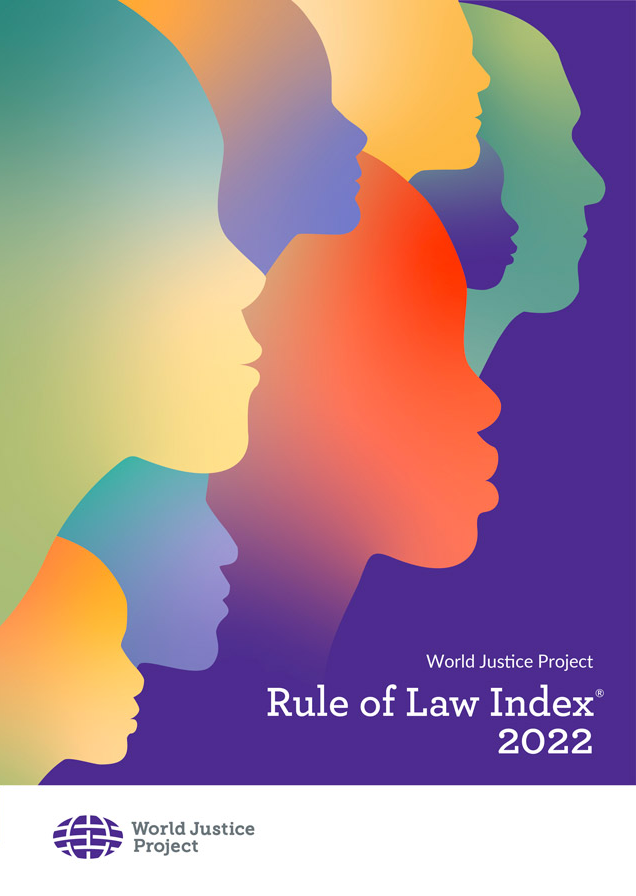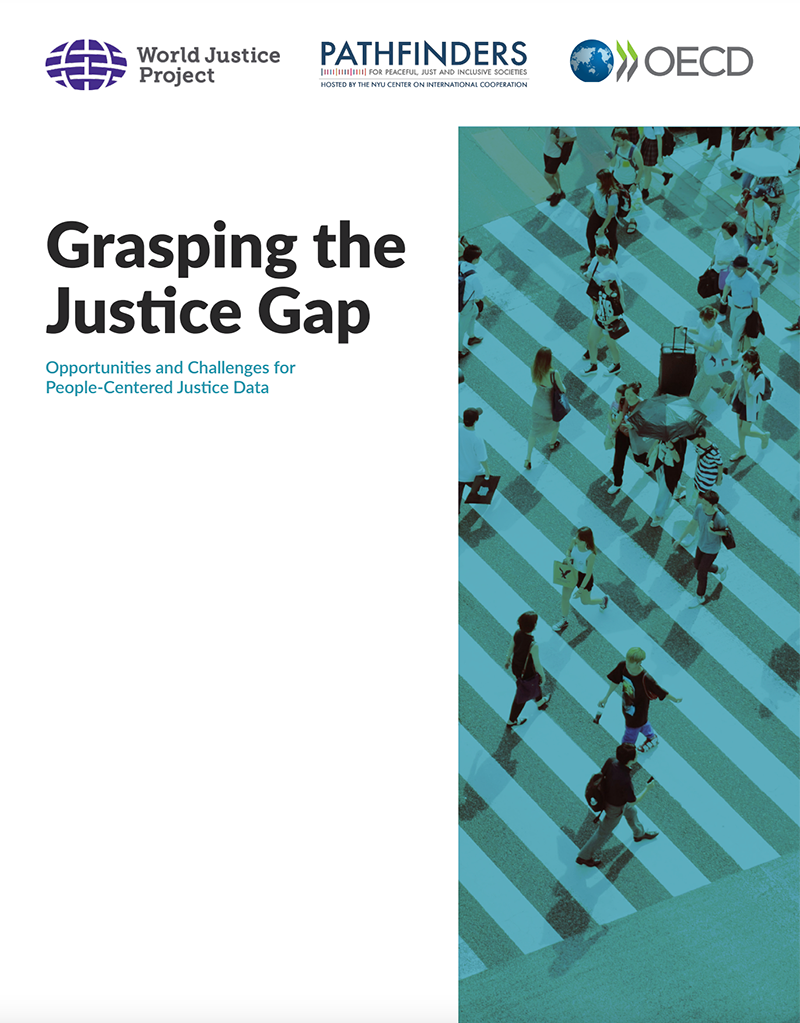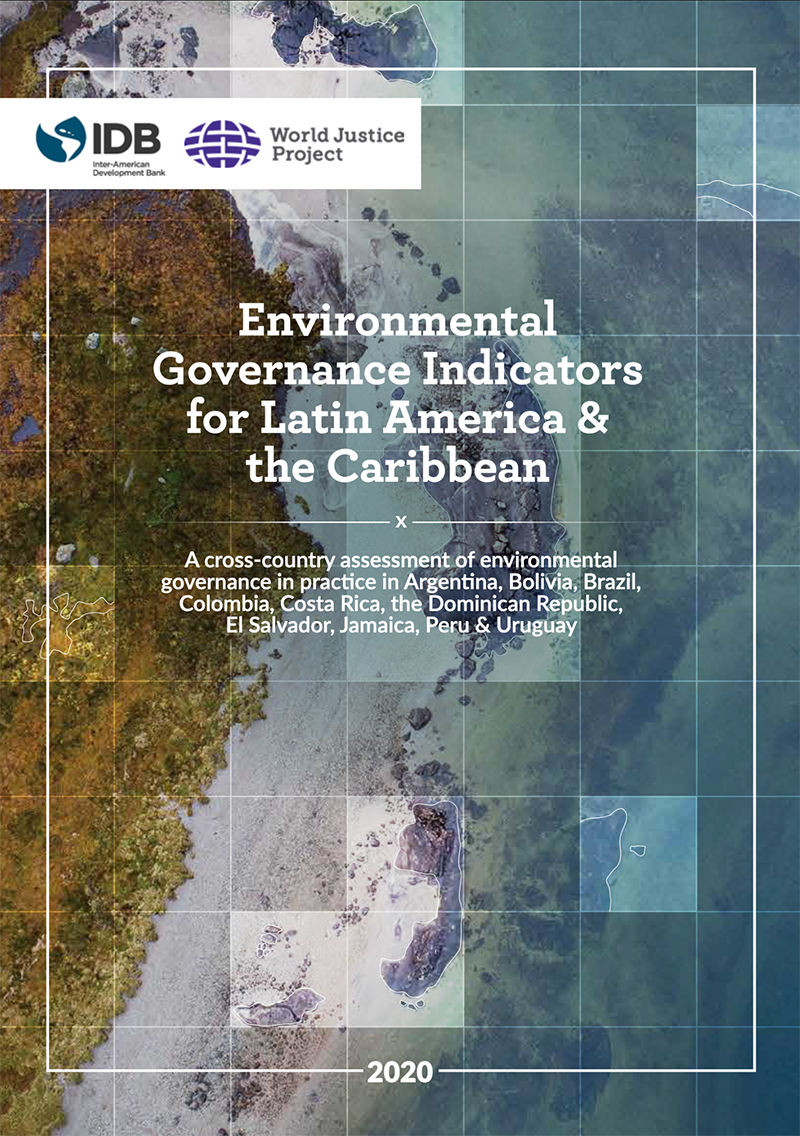The Rule of Law
in Nicaragua
Key Findings from the General
Population Poll 2022
Acknowledgements
The Rule of Law in Nicaragua: Key Findings from the General Population Poll 2022 was produced by the World Justice Project under the research oversight of Alejandro Ponce and the executive direction of Elizabeth Andersen.
The production of this report was led by Ana María Montoya and Tanya Primiani. This report was prepared by Said Aarji, Erin Campbell, James Davis, Joshua Fuller, Skye Jacobs, Ana María Montoya, Santiago Pardo González, Enrique Paulin, Tanya Primiani, Hannah Rigazzi, Natalia Rodríguez Cajamarca, Jeison Sabogal Sánchez, Victoria Thomaides, Carlos Toruño Paniagua, and Moss Woodbury.
Mariana Lopez was the graphic design lead for this report, with support from Raquel Medina. Photo for cover provided by Azzedine Rouichi via Unsplash.
Sampling, fieldwork, and data processing in Belize, Costa Rica, El Salvador, Nicaragua, and Panama were conducted by CID Gallup, based in Costa Rica. Data collection in Honduras and Guatemala was conducted by Mercaplan, based in Honduras. Scripting of the questionnaire in the online platform SurveyToGo was conducted by Ezekiel Agwata of Polar Solutions.
The findings in this report are taken from the General Population Poll (GPP) conducted for the World Justice Project in 2022. The GPP’s conceptual framework and methodology were developed by Mark David Agrast, Juan Carlos Botero, and Alejandro Ponce. The methodology for this iteration of the GPP was developed by Lindsey Bock, Ana Cárdenas, Alicia Evangelides, Joshua Fuller, Nora Futtner, Amy Gryskiewicz, Verónica Jaso, Ana María Montoya, Alejandro Ponce, Eréndira González Portillo, Tanya Primiani, Hannah Rigazzi, Natalia Rodríguez Cajamarca, Victoria Thomaides, and Marcelo Torres.
This report was made possible with the support of the U.S. Department of State’s Bureau of International Narcotics and Law Enforcement Affairs' Office of Western Hemisphere (INL). The views expressed in this report are those of the survey respondents and do not necessarily represent the views of INL.
© Copyright 2023 by the World Justice Project.
Requests to reproduce this document should be sent to:
Alejandro Ponce
World Justice Project
1025 Vermont Avenue NW, Suite 1200
Washington, DC 20005, USA
Email: [email protected]
Washington, DC
1025 Vermont Avenue NW, Suite 1200
Washington, DC 20005, USA
P +1 (202) 407-9330
Mexico City
Gobernador José Guadalupe Covarrubias
57-20, San Miguel Chapultepec, 11850,
Miguel Hidalgo, Mexico City
worldjusticeproject.mx
ABOUT
THIS REPORT
ABOUT THIS REPORT
EFFECTIVE RULE OF LAW reduces corruption, combats poverty and disease, and protects people from injustices large and small. Strengthening the rule of law is an important objective for governments, donors, and civil society organizations around the world. To be effective, rule of law development requires clarity about the fundamental features that define the rule of law, as well as an adequate basis for its evaluation and measurement.
The Rule of Law in Nicaragua: Key Findings from the General Population Poll 2022 presents question-level data drawn from the General Population Poll (GPP), an original data source designed and collected by the World Justice Project. To provide a more in-depth view of trends in perceptions of rule of law in Nicaragua, this report also presents select findings over time and compared to Nicaragua’s regional peers within the Central American subregion of Latin America and the Caribbean.
The GPP was conducted in January 2023 via telephone interviewing to a nationally representative sample of 1,014 Nicaraguan households. This poll was designed to capture data on the experiences and perceptions of ordinary people regarding a variety of themes related to the rule of law.
This report represents the voices of people in Nicaragua and their experiences with the rule of law in their country.
The data derived from the General Population Poll is presented in this report as thematic briefs, each one highlighting a different dimension of the rule of law from the perspective of Nicaraguans. These thematic briefs focus on the current rule of law ecosystem in Nicaragua while simultaneously illuminating changes over time and comparisons across the following peer countries in the Central American region: Belize, Costa Rica, El Salvador, Guatemala, Honduras, and Panama. Each section touches upon perceptions of and attitudes towards the following topics: fundamental freedoms, corruption, bribery victimization, crime victimization, and security.
Note on Nicaragua
The data presented in The Rule of Law Nicaragua: Key Findings from the General Population Poll 2022 represents the perceptions and experiences of individuals living in this country. The results show a more favorable perception of the rule of law situation in the country than is reflected in expert analysis, particularly when compared to results of other countries with similar governance structure and level of economic development.
The data presented in this report has undergone a rigorous validation process. The team conducted five separate tests to ensure the accuracy of data:
- Statistical validation: The team verified the data routing, labeling, and coding and did not find any issues.
- Sampling plan validation: The team checked the consistency of the sampling plan against the data collected by the polling company. More information about the sampling plan is available in the Methodology section of this report.
- Internal checks against different variables: The normalized scores of perception questions were checked against sociodemographic, socioeconomic characteristics (sex, age, income, educational level, ethnicity, urbanization, and crime victimization).
- Checks against external quantitative sources: The team normalized the General Population Poll data in Nicaragua and compared these scores to other external quantitative sources, including Latin American Public Opinion Project (LAPOP)’s AmericasBarometer, and Latinobarómetro. These checks compared similar perception questions in the questionnaires and overall trends for a broader set of questions. The AmericasBarometer and Latinobarómetro data revealed similar trends in that they also showed improved perceptions in Nicaragua on measures of government accountability, fundamental freedoms, trust in institutions, support for victims of crime, and security.
- Checks against external qualitative sources: The team reviewed current events, expert-based measures – including the WJP Qualified Respondents Questionnaires –as well as qualitative reports from other organizations such as Human Rights Watch, Transparency International, Freedom House, and Varieties of Democracy (V-Dem).
The results of our various checks confirmed the internal validity of our data, in that it accurately represents the views and experiences of respondents in Nicaragua at the time the data was collected. However, there may be discrepancies between our data and other expert assessments. For instance, the data collected from experts in Nicaragua by the WJP in the Qualified Respondents Questionnaires in 2022 presents a departure from the views of the general population. Other human rights organizations and regional experts such as Human Rights Watch, Transparency International, Freedom House, and Varieties of Democracy (V-Dem) have also expressed alternate views from the data presented in this report. These organizations highlight the challenges that Nicaragua is facing with accountability, civil liberties, judicial independence, due process, security, and other thematic topics discussed in this report.
The data in this report highlights moderate declines over the last nine years, yet overall perceptions of the general population in 2022 are more positive than information presented by other organizations in the above listed sources as well as expert data collected for the WJP Rule of Law Index®. The results are also more positive than one would expect given the current political situation in the country. In May 2021, Daniel Ortega, Nicaragua’s president, and member of the Sandinista National Liberation Front (FSLN), has implemented electoral reforms that cemented FSLN as the ruling party in Nicaragua and ensured his reelection in the November elections that same year. These elections were overwhelmingly described as unfree, unfair, and lacking transparency. Additionally, massive arrests of political opponents, members of the press, and other dissidents, coupled with accusations of torture and disappearances of those detained, effectively limited opposition within the country. While the World Justice Project protects the privacy of all individuals who participate in our surveys and the data is internally valid, there are external factors—such as government monitoring and surveillance—that could lead individuals to be more reserved in their answers about the thematic topics discussed in this report. Further information on the rule of law in Nicaragua can be found at the Country Insights page from the WJP Rule of Law Index 2022®.
EXECUTIVE FINDINGS
The Rule of Law in Nicaragua: Key Findings from the General Population Poll 2022 provides a comprehensive overview of how citizens perceive and experience the rule of law in Nicaragua alongside comparative findings across the Central American region. The findings in this report indicate some positive trends in the general public’s perspective on the rule of law in Nicaragua, including high rates of crime reporting. Despite this positive development, however, these findings highlight the fact that many challenges—including deteriorating perceptions of fundamental freedoms, worsening perceptions of corruption, and worsening perceptions of personal safety—persist. At the regional level, prominent trends include deteriorating perceptions of fundamental freedoms and low levels of trust in institutions.
SECTION 1
Fundamental Freedoms
1. Fundamental Freedoms
On average, fewer respondents believe that their freedoms of expression, political participation, election, and religion are guaranteed in Belize, Guatemala, Nicaragua, and Panama compared to the last year of data collection. In contrast, the average percentage of respondents who believe that these freedoms are guaranteed increased in Costa Rica, El Salvador, and Honduras. Throughout the region, Costa Ricans, on average, most often felt that fundamental freedoms are guaranteed by the state, while Nicaraguans least often felt the same.
- When asked about respect for fundamental freedoms in Nicaragua, respondents had more favorable views on freedom of religion, with 71% of respondents agreeing that religious minorities can observe their holy days. Conversely, Nicaraguans had less favorable views on freedoms of expression and electoral freedoms, with 41% of respondents agreeing that the media can express opinions against the government without fear of retaliation and local government officials are elected through a clean process.
- Between 2019 and 2022, Nicaragua’s most significant trends in public opinions on freedoms include declines in the perceptions that people can join any political organization (down 24 percentage points), people can vote freely without feeling harassed or pressured (down 19 percentage points), and civil society organizations can express opinions against the government (down 19 percentage points).
SECTION 2
Corruption and Trust
2. Corruption
Public views on the pervasiveness of corruption within the legislature, law enforcement, the executive branch, and the judiciary improved, on average, in El Salvador, Guatemala, Honduras, and Panama, whereas overall perceptions of corruption deteriorated in Belize, Costa Rica, and Nicaragua. Compared to Central American peer countries, El Salvador saw the largest decreases in the percentage of respondents who believe that some or all of the actors across all of these institutions are involved in corrupt practices, while Nicaragua saw the largest increases in the percentage of respondents who believe the same. On average, more Nicaraguans reported perceptions of corruption across all actors than their regional peers in Central America, while Salvadorans reported the same least frequently.
- Perceptions of corruption in Nicaragua deteriorated most for police officers, with 51% of respondents believing that most or all police officers engage in corrupt practices in 2022, compared to 36% in 2019.
- Members of political parties are considered the most corrupt actors in Nicaragua. Approximately 61% of respondents believe that most or all members of Nicaraguan political parties are involved in corrupt practices.
- Teachers in public schools are considered the least corrupt actors in Nicaragua, with 22% of respondents reporting that they believe most or all teachers are involved in corrupt practices.
3. Bribery Victimization
On average, Central American respondents reported paying a bribe most often in Nicaragua and least often in Costa Rica. Throughout the region, respondents most frequently had to pay a bribe when requesting a government permit and least often when using public health services, on average.
SECTION 3
Security and Criminal Justice
4. Crime Victimization
Public views on the pervasiveness of corruption within the legislature, law enforcement, the executive branch, and the judiciary improved, on average, in El Salvador, Guatemala, Honduras, and Panama, whereas overall perceptions of corruption deteriorated in Belize, Costa Rica, and Nicaragua. Compared to Central American peer countries, El Salvador saw the largest decreases in the percentage of respondents who believe that some or all of the actors across all of these institutions are involved in corrupt practices, while Nicaragua saw the largest increases in the percentage of respondents who believe the same. On average, more Nicaraguans reported perceptions of corruption across all actors than their regional peers in Central America, while Salvadorans reported the same least frequently.
- Forty-three percent (43%) of Nicaraguans reported experiencing a crime in the last 12 months, a figure above the regional average (27%).
- More than half (52%) of Nicaraguan respondents who were victims of a crime reported the crime to an authority.
5. Security
More than half of all Central American respondents feel safe or very safe when walking in their neighborhood at night. Perceptions of safety improved or remained the same in 5 out of 7 Central American countries between 2022 and the last year of data collection, and declined only in Panama and Nicaragua (down 5 and 8 percentage points, respectively). Compared to respondents in regional peer countries, Salvadorans most often reported feeling safe in their neighborhood at night (89%), while slightly more than half of Costa Ricans, Nicaraguans, and Panamanians (52%) reported the same.
- In Nicaragua, just over half (52%) of all respondents reported feeling safe walking in their neighborhood at night in 2022, marking a decline of 8 percentage points since 2019.
- Nicaraguan women, Nicaraguans who had previously been a victim of a crime, and Nicaraguans who are financially insecure were less likely to feel safe walking in their neighborhood at night than respondents with other sociodemographic characteristics.
Note: In addition to the data found in regional charts included in this report, comparative data for regional peer countries referenced in the Executive Findings can be found in each country’s respective report.
THEMATIC FINDINGS
SECTION I
FUNDAMENTAL FREEDOMS
FUNDAMENTAL FREEDOMS
CHART 1.
Fundamental Freedoms in Nicaragua Over Time
Percentage of respondents who believe the following statements
EXPRESSION
People can express opinions against the government
Civil society organizations can express opinions against the government
Political parties can express opinions against the government
The media can express opinions against the government without fear of retaliation
The media can expose cases of corruption
Source: WJP General Population Poll 2014, 2017, 2019, and 2022
PARTICIPATION
People can attend community meetings
People can join any political organization
People can organize around an issue or petition
ELECTIONS
Local government officials are elected through a clean process
People can vote freely without feeling harassed or pressured
RELIGION
Religious minorities can observe their holy days
Source: WJP General Population Poll 2014, 2017, 2019, and 2022
CHART 2.
Perceptions of Fundamental Freedoms in Central America
Percentage of respondents who believe the following statements
BLZ = Belize CRI = Costa Rica SLV = El Salvador GUA = Guatemala HND = Honduras NIC = Nicaragua PAN = Panama
EXPRESSION
People can express opinions against the government
Civil society organizations can express opinions against the government
Political parties can express opinions against the government
The media can express opinions against the government without fear of retaliation
The media can expose cases of corruption
Source: WJP General Population Poll 2022
PARTICIPATION
People can attend community meetings
People can join any political organization
People can organize around an issue or petition
ELECTIONS
Local government officials are elected through a clean process
People can vote freely without feeling harassed or pressured
RELIGION
Religious minorities can observe their holy days
Source: WJP General Population Poll 2022
THEMATIC FINDINGS
SECTION II
CORRUPTION
CORRUPTION
CHART 3.
Perceptions of Corruption by Institution Over Time
Percentage of respondents who believe that most or all people working in the following institutions are corrupt
MEMBERS OF THE NATIONAL ASSEMBLY
POLICE OFFICERS
EXECUTIVE
Local Government Officers
National Government Officers
JUDICIARY
Prosecutors Judges & Magistrates
Public Defense Attorneys
Source: WJP General Population Poll 2014, 2017, 2019, and 2022
CHART 4.
Perceptions of Corruption in Central America, by Institution
Percentage of respondents who think people in the following groups are involved in corrupt practices
◆Belize ◆Costa Rica ◆El Salvador ◆Guatemala ◆Honduras Nicaragua ◆Panama
THE MEDIA AND POLITICAL PARTIES
NATIONAL AND LOCAL GOVERNMENT
ADMINISTRATIVE AND BUREAUCRATIC INSTITUTIONS
SECURITY AND JUSTICE INSTITUTIONS
Source: WJP General Population Poll 2022
CHART 5.
Attitudes Towards Corrupt Behaviors in Central America
Percentage of respondents who believe the following behaviors are always or usually acceptable
◆Belize ◆Costa Rica ◆El Salvador ◆Guatemala ◆Honduras Nicaragua ◆Panama
BRIBES OFFERED
BRIBES REQUESTED
NEPOTISM AND EMBEZZLEMENT
Source: WJP General Population Poll 2022
BRIBERY VICTIMIZATION
CHART 6.
Bribery Victimization in Nicaragua and Regional Peer Countries
Percentage of respondents who paid a bribe in the last three years to access the following services, out of those who used these services
REQUEST A GOVERNMENT PERMIT OR DOCUMENT
REQUEST PUBLIC BENEFITS OR ASSISTANCE
OBTAIN A BIRTH CERTIFICATE OR GOVERNMENT ISSUED ID
SECURE A PLACE AT A PUBLIC SCHOOL
USE A PUBLIC HEALTH SERVICE
Source: WJP General Population Poll 2022
THEMATIC FINDINGS
SECTION III
CRIME AND SECURITY
CRIME VICTIMIZATION
CHART 7.1
Types of Crimes Experienced by People in Nicaragua
Victimization rate, by type of crime
CHART 7.2
Crime Victimization Rates and Reporting
Data on crime victimization and reporting in Nicaragua
Note: For additional information on how Chart 7.1 and 7.2 were produced, please see the Appendix.
Source: WJP General Population Poll 2022
SECURITY
CHART 8.1
Perceptions of Security in Nicaragua Over Time
Percentage of respondents who reported that they feel safe or very safe walking in their neighborhood at night
Source: WJP General Population Poll 2014, 2017, 2019, and 2022
CHART 8.2
Impact of Sociodemographic Characteristics on Perceptions of Safety
Likelihood that respondents feel safe or very safe walking in their neighborhood at night
Note: The results in this infographic were obtained from a logit regression. Each point indicates the average marginal effect of the corresponding sociodemographic characteristic on the predicted probability of a respondent to answer “safe” or “very safe” to the question “How safe do you feel walking in your neighborhood at night?” The lines indicate the 95% confidence intervals of each average marginal effect. For additional information on how Chart 8.2 was produced, please see the Regression Key linked in the Appendix.
Source: WJP General Population Poll 2022
PROJECT DESIGN
METHODOLOGY
To present an image that accurately portrays the rule of law as experienced by ordinary people, data in this report is drawn from the General Population Poll (GPP), an original data source designed and collected by the World Justice Project (WJP). The GPP captures the experiences and perceptions of ordinary citizens concerning the performance of the state and its agents and the actual operation of the legal framework in their country.
The General Population Poll used to collect data in Nicaragua in 2022 features several new questions that highlight perceptions on issues salient to the region, including corruption, authoritarian behaviors, police performance, criminal justice, and security. In total, the General Population Poll questionnaire includes 51 perception-based questions and 16 experience-based questions, along with sociodemographic information on all respondents. Additionally, the GPP in Nicaragua was administered to a sample of 1,014 respondents.
Data Collection
The GPP in Nicaragua was conducted for the WJP's The Rule of Law in Nicaragua: Key Findings from the General Population Poll 2022 with sampling, fieldwork, and data processing by CID Gallup, based in San José, Costa Rica. CID Gallup administered the surveys in January 2023, conducting computer-assisted telephone interviews using a stratified random sampling design. The target population group for this survey included Nicaraguans aged 18 years or older residing across 15 departments and two autonomous regions throughout the country.
SAMPLE SIZE AND SAMPLE FRAME
The General Population Poll in Nicaragua represents an achieved total sample size of 1,014 interviews distributed proportionally across two regions. CID Gallup based the sampling frame on the most recent population projections from the Nicaraguan National Institute of Information Development (INIDE), acquiring a proportionally stratified sample by department and region, age, gender, socioeconomic status, and level of urbanization.
In order to address all relevant topics while controlling the questionnaire length, the World Justice Project split three of the survey modules into two versions (Option A and Option B) and randomly assigned one option to each respondent for each module. These modules included: Hypothetical Situations, Civic Participation, and Institutional Performance. Aside from these modules, the questionnaires are identical. A link to the complete survey instrument, in English and Spanish, can be found in the Appendix of this report.
SAMPLING
All interviews in Nicaragua were conducted using a CATI (computer-assisted telephone interviewing) system via random digit dialing (RDD). For landline users, “seed” blocks of telephone numbers were randomly selected from Nicaragua’s national number framework. The number of seed blocks in a particular department was determined based on relative population size and departments were identified by area codes. To reach mobile cell phone users, cell phone numbers were first classified by residential and commercial use and commercial mobile phone numbers were excluded from the sample. Seed blocks were stratified across mobile providers and divided into segments of 100 phone numbers each. Within each segment, phone numbers were selected randomly based on the last two digits. Two attempts were made to reach each respondent before the system removed the phone number and selected a new one.
DESCRIPTION OF THE SAMPLE
COVERAGE: Interviews were distributed across regions to create a nationally representative sample. Twenty-five percent (25%) of the interviews took place in Managua and the remaining 75% of the interviews took place in the rest of the country.
GEOGRAPHY: Thirty-two percent (32%) of respondents resided in rural areas and municipalities, while 68% of respondents resided in metro areas or cities.
RACIAL AND ETHNIC BACKGROUND: Twenty-six percent (26%) of respondents identified themselves as Mestizo, followed by Afro-Nicaraguan (21%) and White (19%). Twenty percent (20%) of respondents identified as “Other.”
GENDER: Fifty-two percent (52%) of respondents were female and 48% were male.
EDUCATION: Most respondents (56%) reported that they had received up to a middle school diploma, and the remaining 44% of respondents received at least a high school diploma or vocational degree.
RESPONSE RATES
| Eligible household, non-interview | 5,746 |
| Refusals | 3,853 |
| Break-off | 76 |
| Non-contact | 1,817 |
INTERVIEWING AND QUALITY CONTROL
In total, 44 interviewers, including 25 female interviewers, and four supervisors worked on this project. Interviews were conducted in Spanish.
The supervisory team directly oversaw 46% of all interviews. During data processing, 629 interviews (approximately 62% of the sample) were selected for audio review by the central office. Additional quality control measures included audio quality checks and checks for abnormal interview length. Interviews averaged 40 minutes in length and ranged from 21 to 99 minutes.
DATA REVIEW AND JUSTIFICATION
As part of the data analysis process, the team consulted several third-party sources in order to contextualize and validate perception-based data captured by the General Population Poll and compare it with the objective rule of law situation in-country. Peer data sources consulted include select indicators measured by the Latin American Public Opinion Project (LAPOP)'s AmericasBarometer, Latinobarómetro, Varieties of Democracy (V-Dem), Transparency International's Corruption Perceptions Index, the Bertelsmann Stiftung's Transformation Index (BTI), and Freedom House's Freedom in the World. While certain trends captured by the 2022 General Population Poll in Nicaragua are comparable to trends in perceptions data measured by other indices, the experiences and perceptions presented in this report may not always coincide with the reality of Nicaragua's rule of law performance as measured by other sources.
HISTORICAL DATA
Historical data in this report derives from the WJP Rule of Law Index®'s General Population Poll that is typically administered every two to three years using a nationally representative probability sample ranging from 500 to 1,000 respondents. These household surveys were administered in the three largest cities of most countries until 2018, when the World Justice Project transitioned to nationally representative coverage as the preferred methodology for polling. The historical polling data used in this year's reports was collected in the following intervals: Data for Belize, Costa Rica, and Honduras was collected in 2014, 2017, 2019, and 2022. Data for Panama was collected in 2014, 2017, 2019, and 2022. Data for El Salvador and Guatemala was collected in 2016, 2018, and 2022.
ADDITIONAL COUNTRIES
The Rule of Law in Nicaragua: Key Findings from the General Population Poll 2022 includes comparisons to the following Central American countries surveyed by the World Justice Project during the same period: Belize, Costa Rica, El Salvador, Guatemala, Honduras and Panama. This report is additionally part of a series that presents findings from the following five sub-regions within Latin America and the Caribbean: Andes (Bolivia, Colombia, Ecuador, Peru); Southern Cone (Argentina, Brazil, Paraguay); Eastern Caribbean (Barbados, Dominica, Grenada, St. Lucia, St. Vincent and the Grenadines, Trinidad and Tobago); Greater Antilles, The Bahamas, and the Guianas (The Bahamas, the Dominican Republic, Guyana, Haiti, Jamaica, Suriname); and Central America (Belize, Costa Rica, El Salvador, Guatemala, Honduras, Nicaragua, Panama). Together, these 26 countries are a portion of the 140 countries and jurisdictions included in the WJP Rule of Law Index 2022 report. Detailed information regarding the methodology of the Rule of Law Index is available at: www.worldjusticeproject.org.
| Country | Polling Company | Methodology | Sample |
| Argentina | StatMark Group | Face-to-face | 759 |
| The Bahamas | DMR Insights Ltd. | Face-to-face | 500 |
| Barbados | DMR Insights Ltd. | Face-to-face | 500 |
| Belize | CID Gallup | Face-to-face | 1,500 |
| Bolivia | Captura Consulting | Face-to-face | 1,000 |
| Brazil | About Brazil Market Research | Face-to-face | 1,109 |
| Colombia | Tempo Group SA | Face-to-face | 1,000 |
| Costa Rica | CID Gallup | Face-to-face | 1,005 |
| Dominica | DMR Insights Ltd. | Face-to-face | 500 |
| Dominican Republic | CID Gallup | Face-to-face | 1,002 |
| Ecuador | StatMark Group | Face-to-face | 1,005 |
| El Salvador | CID Gallup | Face-to-face | 2,010 |
| Grenada | DMR Insights Ltd. | Face-to-face | 500 |
| Guatemala | Mercaplan | Face-to-face | 2,002 |
| Guyana | StatMark Group | Face-to-face | 500 |
| Haiti | CID Gallup | Face-to-face | 507 |
| Honduras | Mercaplan | Face-to-face | 2,000 |
| Jamaica | StatMark Group | Face-to-face | 1,001 |
| Nicaragua | CID Gallup | Telephone | 1,014 |
| Panama | CID Gallup | Face-to-face | 2,023 |
| Paraguay | Datum Internacional S.A./BM Business Partners | Face-to-face | 1,000 |
| Peru | Datum Internacional S.A. | Face-to-face | 1,029 |
| St. Lucia | DMR Insights Ltd. | Face-to-face | 500 |
| St. Vincent and the Grenadines | DMR Insights Ltd. | Face-to-face | 500 |
| Suriname | D3: Designs, Data, Decisions | Face-to-face | 502 |
| Trinidad and Tobago | CID Gallup | Face-to-face | 1,001 |
APPENDIX
APPENDIX
Methodological Materials
GENERAL POPULATION POLL (GPP)
The General Population Poll in Nicaragua was designed to capture high-quality data on the realities and concerns of ordinary people on a variety of themes related to the rule of law, including fundamental freedoms, corruption, bribery victimization, crime, and security.
VARIABLES USED IN INFOGRAPHICS ON CRIME VICTIMIZATION
This table lists the question-level variables from the General Population Poll used to construct Chart 7.1 and the “Reasons the crime was not reported” table in Chart 7.2.
World Justice Project Crime Rates and Reporting Variable Map
REGRESSION TABLES FOR REGRESSION ANALYSIS USED IN INFOGRAPHICS ON PERCEPTIONS OF SECURITY AND MIGRATION
This document includes the question-level variables from the General Population Poll used in the regression analysis and the regression results featured in Chart 8.2.
ABOUT THE WORLD JUSTICE PROJECT
The World Justice Project (WJP) is an independent, multidisciplinary organization working to create knowledge, build awareness, and stimulate action to advance the rule of law worldwide. Effective rule of law is the foundation for communities of justice, opportunity, and peace–underpinning development, accountable government, and respect for fundamental rights.
The WJP builds and supports a global, multidisciplinary movement for the rule of law through three lines of work: collecting, organizing, and analyzing original, independent rule of law data, including the World Justice Project Rule of Law Index; supporting research, scholarship, and teaching about the importance of the rule of law, its relationship to development, and effective strategies to strengthen it; and connecting and building an engaged global network of policymakers and advocates to advance the rule of law through strategic partnerships, convenings, coordinated advocacy, and support for locally led initiatives.
Learn more at: worldjusticeproject.org.
OTHER PUBLICATIONS
For more information click on the publication.
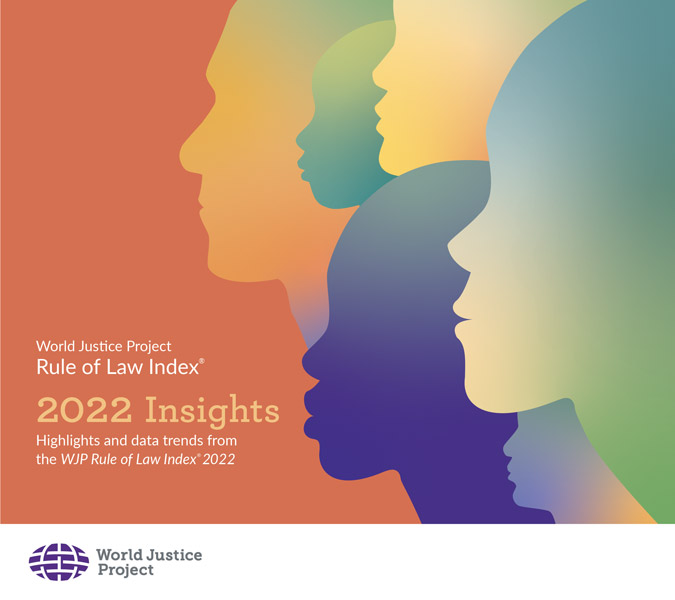
WJP Rule of Law Index 2022 Insights
Highlights and data trends from the WJP Rule of Law Index 2021
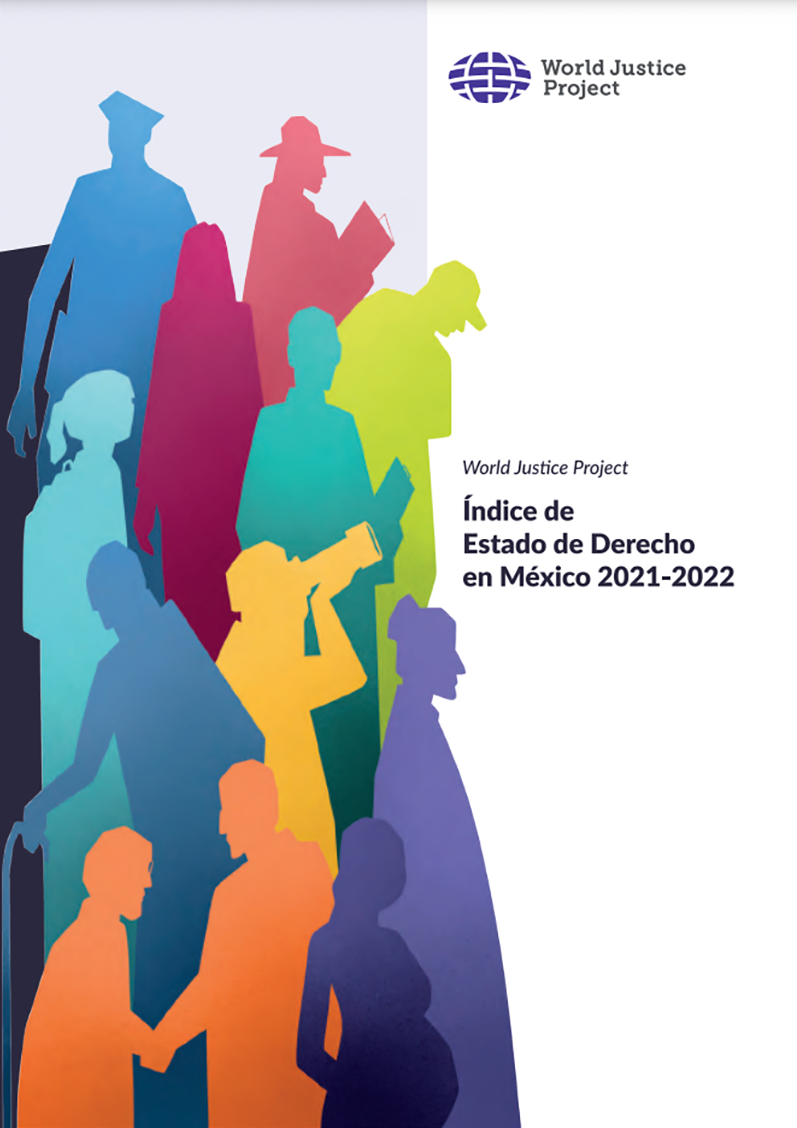
WJP Mexico States Rule of
Law Index 2020-2021
Perceptions and experiences in 32 states
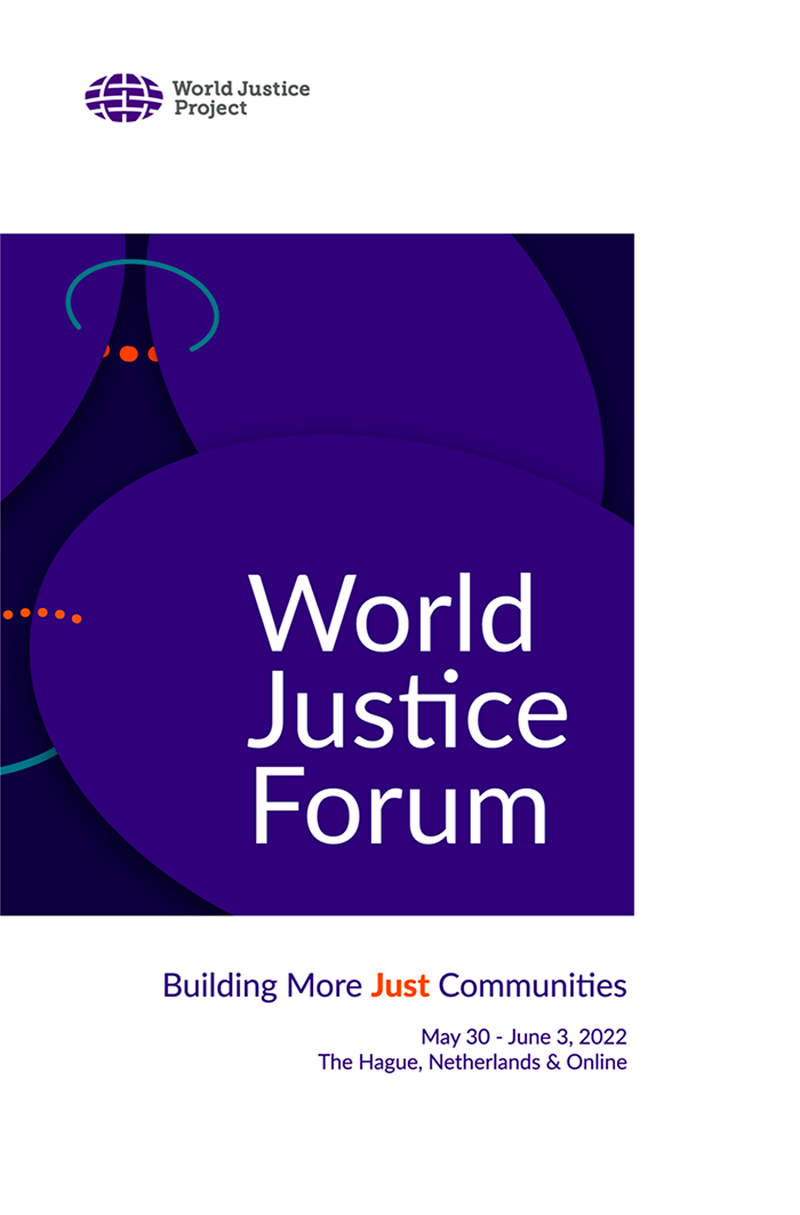
World Justice Challenge 2021
Outcome Report
For more information or to read these reports, visit worldjusticeproject.org/our-work
